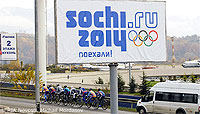Sochi Spotlights Weakness as Caucasus Remains Restive

(Bloomberg – bloomberg.com – February 4, 2013 – Ilya Arkhipov and Stepan Kravchenko)
The Sochi Olympics, designed to trumpet the strength of Vladimir Putin’s Russia, also shines a light on its weaknesses.
As skiers, hockey players and figure skaters arrive this week at the games that cost about $50 billion, the North Caucasus region remains unruly more than 14 years after Putin came to power promising order. Two Chechen wars since the fall of communism and countless operations since have failed to end the violence.
For all of Putin’s efforts to make the games safe, a recent wave of terrorist attacks served as a reminder that he’s struggling to suppress an insurgency in the region even after the government turned to more forceful methods, according to Human Rights Watch. A report by Caucasian Knot last week showed that the number of civilians killed in the region rose 20 percent last year, while militants are reaching further afield.
“The Kremlin can reduce the number of attacks and victims in the short term with the use of brutal force,” said Grigory Shvedov, who runs Caucasian Knot, a Moscow-based news and research center. “In the long term, that increases the number of people ready to act extremely radically.”
Suicide Bombings
That shift may account for the number of civilians killed in the North Caucasus, mainly during anti-terror operations, which rose to 104 last year from 87 in 2012 even as the total number of fatal casualties fell 24 percent to 529, according to Caucasian Knot. The number of suicide bombings in Russia rose to nine from seven, it said.
While those numbers provide a glimpse of the violence in the volatile region itself, recent attacks showed that the threat isn’t limited to the North Caucasus federal district’s seven regions on the slopes of the Caucasus Mountains.
Three suicide attacks last year rocked Volgograd, once known as Stalingrad, about halfway between Moscow and Sochi, 430 kilometers (257 miles) from the war-wracked region of Dagestan. On Oct. 21 a female bomber blew herself up in a bus, killing six people. On Dec. 29 and 30, explosions killed more than 30 people at a train station and on a trolleybus.
Two suspects in the case were detained in Dagestan last week, Russian authorities said Jan. 30.
Terror ‘Peak’
“The escalation of terror is at a peak now and I can’t say it won’t continue after the Games,” Alexei Malashenko, an analyst at the Moscow Carnegie Center, said by phone.
At Sochi, a cluster of events will be held on the westernmost slopes of the Caucasus mountains, which stretch about 1,200 kilometers across Chechnya to Dagestan on the Caspian coast, one of Russia’s poorest regions. Chechen rebels have fought two wars against the federal government since 1994. The separatist movement has grew into an Islamist insurgency that took its fight to neighboring provinces.
Putin vowed to keep Sochi safe by locking down the seaside resort city of about 345,000, deploying 40,000 troops and state of-the-art equipment. The 30,000 soldiers in Russia’s 49th army are stationed nearby, while 18 Pantsir artillery systems, capable of engaging multiple targets as much as 20 kilometers (12 miles) away, and navy ships are patrolling the water, the Vedomosti newspaper reported.
Even with that display of power, 63 percent of Russians said in a recent poll that they don’t believe the state can protect them from terrorist attacks.
Intelligence ‘Failing’
“Based on terrorism statistics for 2013 we can say that Russian intelligence is failing to keep the country safe,” said Shvedov of the Caucasian Knot, which tracks security data and information in the region.
The government changed tack as the Olympics added a new sense of urgency to Russia’s anti-insurgent campaign. The security crackdown risks further radicalizing groups resisting federal forces, according to Tatyana Lokshina, a program director at Human Rights Watch in Moscow. An increase in abductions and the use of violent tactics by the authorities is damaging dialog with local communities, creating fertile ground for extremist recruiters, Lokshina said.
“As the Olympic Games in Sochi approached, the Kremlin became increasingly concerned with continuous violence in Dagestan and wanted fast results,” she said. “Its soft-power tactics were replaced with the use of brutal force.”
‘Revenge’ Attack
A possible example of the rebound effect, the Volgograd twin bombings showed the traits of “an act of revenge” by people who suffered from Russian security operations in 1990s, according to Nikolai Kovalyov, a former director of the Federal Security Service, the main successor of the Soviet KGB. Revenge is a more common driver for bombers than political motives, he said in an interview.
Wanted posters for 11 suspected terrorists who may have infiltrated the Sochi security zone were plastered on the board of a police booth in front of the city’s sea port today.
While the probability of attacks in Sochi itself is low, the likelihood of terrorist acts elsewhere in Russia is “quite high, four on a scale of one to five,” according to Shvedov of Caucasian Knot. Attackers are likely to target the transport system, he said.
“What’s more likely is a smaller, contained event carried out by an individual or individuals and impacting a limited group of people,” said Dan Richards, the chief executive of crisis response company Global Rescue LLC, which provides security for the U.S. ski team. “Softer targets outside of Sochi where there is less scrutiny and fewer resources deployed likely present appealing targets.”
Article ©2014 Bloomberg L.P. All Rights Reserved. Article also appeared at http://www.bloomberg.com/news/2014-02-03/sochi-spotlights-weakness-as-caucasus-remains-restive.html
